What is Desi Ghee?
A butter derivative with no lactose? It almost seems too good to be true, and yet ghee is very real.
Ghee is a clarified butter that has had its milk solids toasted then skimmed away from the fat, resulting in a product that combines oil’s very high smoke point and butter’s rich, nutty flavor and excellent nutritional profile.
Ghee may only now be appearing on store shelves with any regularity, but it has been around for more than 5,000 years throughout the Indian subcontinent, where it is traditionally made from sacred cows’ milk & used in religious ceremonies. Desi ghee is also commonly used as a cooking, particularly in Punjabi cuisine – the regional cuisine served in most Indian restaurants – where it is preferred to oil for its rich flavor.
Traditionally Desi Ghee stands for Desi Cow Ghee made by bilona churned method. That too where the milk has been obtained from grass-fed cows and then the Ghee itself obtained via curd route. It is said to be believed and has been proven by Ayurveda that this Ghee has tremendous health qualities to make one healthy internally and externally. These qualities of cow ghee are of golden yellow color and emancipates usually a nutty flavor. This desi quality ghee is found wonderfully shelf-stable and can be preserved in kitchen at least from 12 to 18 months from its date of manufacturing.
Desi cow ghee is mostly made in domestic process and are not treated with artificial color, preservative, or any type of additive. This is the reason desi cow ghee stands for unadulterated pure cow ghee.
Desi cow ghee contains Multiple numbers of vitamins (A, E,D, K), Medium Chain fatty acids like CLA, Butyric acid, Omega3 and 6, etc. which are the reasons behind the health benefits of this dairy product.
Organic desi ghee is loaded with saturated fats and presently dieticians are recommending to add desi ghee is diet in moderation for staying hale hearty.
Desi ghee can be used for baking, sautéing, deep frying as this pantry staple offers high smoke points. This is a dairy product that is free of lactose and casein and that makes desi ghee completely safe for lactose intolerant people. According to Indian Ayurveda, desi ghee is an ayurvedic elixir that helps its consumers to enjoy added health benefits and enhanced immunity level.
What is desi cow ghee used for? A substitution for many cooking oils
Ghee can be used as a substitution for many cooking oils including coconut oil, vegetable oil, or palm oil.
Ghee is a saturated fat that is stable for cooking. Some oils, like sunflower or safflower, are polyunsaturated fats, making them unstable for cooking. Ghee is great to cook and sauté with because of its high heat-stability. Unstable oils will smoke quicker and at lower rates, and vegetable oil can even turn rancid if not used at the proper temperatures.
Consider using desi cow ghee to cook with if you want to an alternative oil that is stable and presents a delicious taste to your food.

Ghee is used for a diet with higher levels of some vitamins and nutrients
Ghee contains vitamins A, D, E and K, and because the vitamins in milk are primarily stored in the fat, ghee typically contains them in higher concentration than you would find in plain cow’s milk.
Vitamin A in ghee is particularly interesting because it’s fat soluble, meaning that it is useable to the body immediately. It can also be absorbed by the body properly because of ghee’s fatty acid cofactors that help the process along.
Vitamin K2 is found in ghee as well. This nutrient is not found in many foods and is extremely important in helping bones absorb calcium. Vitamin K2 is also fat soluble so ghee provides the same environment as it does with vitamin A.
Desi cow ghee is used for enhancing a variety of meals
There are so many ways to use ghee with food, especially since ghee can be used as a replacement for butter or oils.
Here is just a small sampling of the ways you can be using ghee with your food:
- On or in any type of baked good, like breads, muffins, scones, or bagels
- On or used to cook any type of vegetables or mushrooms
- Included as an ingredient in sauces, smoothies, and hot cereals
- Blended in coffee drinks
- Sauteing the grains
- Added to any stir fry or stew
Ghee is used for skin and hair treatments, as well as in the eyes and nose
Ghee’s healthful nature also applies externally. Ghee is great for the skin because of its fatty acids, which help induce hydration to cells. Ghee is used on dry or rough hair and skin to help moisturize and deeply condition. Using ghee in the nose in the form of nasal drops is called Nasya treatment and can help with conditions ranging from migraines and tension headaches to hearing and vision problems. Using ghee in the eyes, Netra Basti, cleanses and relaxes eyes, and helps tear ducts.
Ghee has anti-inflammatory properties both internally and externally. This has allowed for relief when used on burns, cuts, scraps, rashes, wounds, acne, or any other type of burning sensation experienced on the skin.
Ghee combats Diabetes by managing Glycemic Index
The glycemic index shows how instant and how high a food combination makes the blood sugar levels rise. Those individuals who are going diabetes are required to consider food with a low level of glycemic index. Those foods that have a high level of GI can lead to severe problems which could last both long-term and short-term for a person having diabetes.
A consistent high level of blood sugar caused by high GI foods can easily be avoided by adding a moderate amount of ghee to food which has shown to decrease the complete glycemic index of the food, also helps to manage blood sugar levels. Such foods that would result in causing a spike in the sugars would now be controlled. Further major advantages of ghee is that it can be poured onto rice and consumed right away, such addition of ghee supports the effortless digestion of rice.
It is suggested by the expert nutritionists that a person should resist adding more than one teaspoon of ghee to dal or rice or any other meal. Likewise, to any other meal with a rise in the level of carbs, consider only one teaspoon of ghee that should be added. With this amount, even though it is moderate in quantity, goes well to ensure effective digestion of the food. Nutritionists also suggest the use of ghee rather than oil for cooking.
People tend to use a different assortment of oils that they feel are nutritious, probably peanut or sunflower oil, however, there is clear evidence that shows that when oil is substituted by ghee, the advantages are far higher. Therefore, Ghee consumption in excess, might work adversely, reversing its benefits which was originally supposed to provide. Try consulting a doctor about the accurate consumption of ghee would be the best.
Read our blog – Why The Pure Desi Cow Milk Ghee Is Costlier Than Normal Ghee?
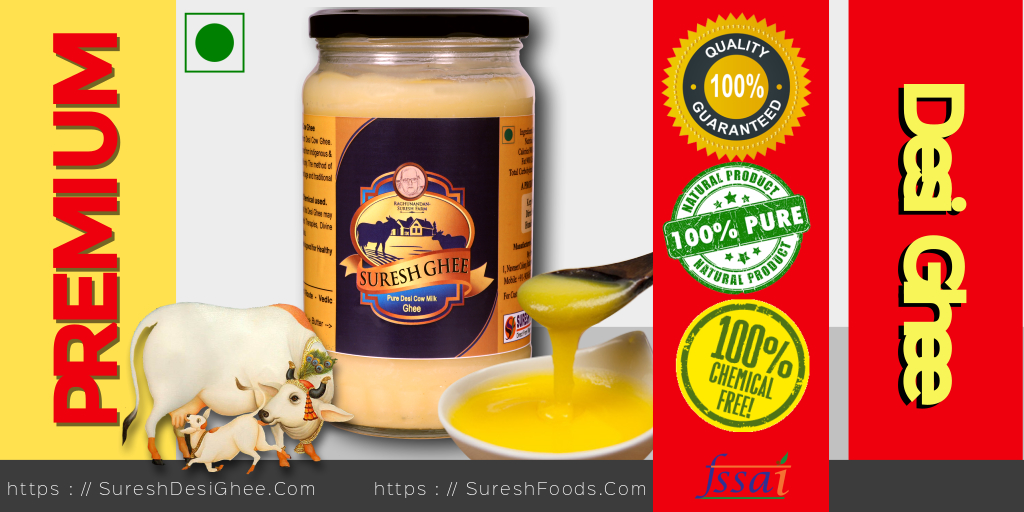
Buy Pure Desi Cow Ghee Online : Order Now. Free Shipping
Is ghee healthy?
Consuming fats in moderation is considered very healthy and also important for weight loss. 20 to 25 percent of our daily calories should come from fat. Healthy fats help our body to preserve cell membrane structure, absorb important nutrients & aid in proper immune system function. It is important to remember that most of the fat calories in pure ghee comes from saturated fat. Eating high amounts of saturated fat is not healthy and we should limit our daily intake of fat from saturated fat to only 10 percent. If you are reasonably healthy, desi cow ghee is considered a smart and healthy addition to your diet.
Here are a few ghee nutrition facts to remember if you are considering adding ghee to your diet. One tablespoon of ghee contains the following:
- 135 calories
- 15 grams of total fat
- 9 grams of saturated fat
- 45 percent of recommended daily amount of fat
- 45 milligrams of cholesterol
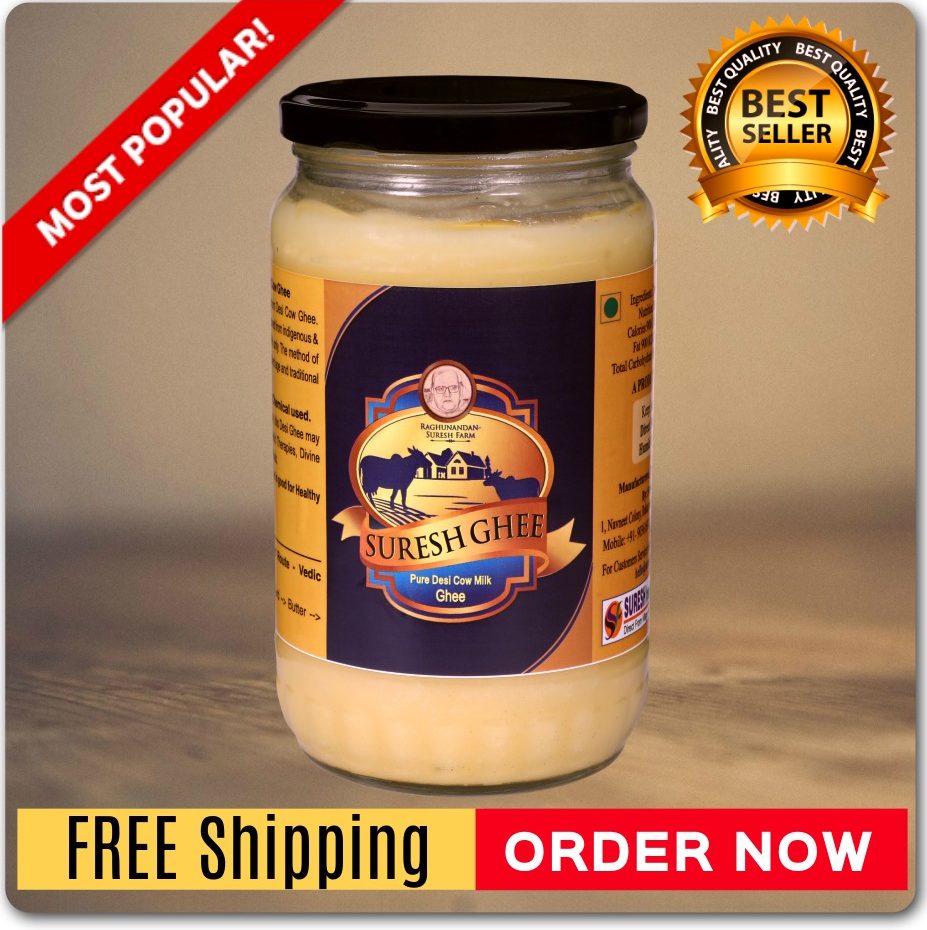
Buy Pure Desi Cow Ghee Online : Order Now. Free Shipping

There are several health benefits of desi cow ghee. In fact, cow ghee has been used in Indian culture for many years in meal preparation as well as in holistic remedies.
The following are some of the many desi cow ghee benefits.
Helps in digestion: Desi ghee helps to minimize stomach acid while also repairing the stomach’s lining. Ghee also produces digestive enzymes which aid food digest properly and reduces episodes of indigestion.
Increases effectiveness of herbal remedies: Desi cow ghee also helps in transporting some herb mixtures that are used in Hindu holistic medicine to cells and organs.
Helps in reducing inflammation: Ghee reduces leukotriene secretion as well as prostaglandin levels which are both linked to inflammation.
Provides antioxidants: Ghee contains vitamins A & E as well as carotenoids. These are all antioxidants that are great for boosting your immune system as well as promoting skin cell growth & better vision.
Good for those who are lactose intolerant: When clarifying butter most of the lactose & casein contained in the butter is removed. Therefore, ghee is a good option to butter for those who may be lactose intolerant.
Adds flavor in cooking: Since the water has been evaporated from the butter, ghee can be added to popcorn without causing it to be soggy. Also, ghee rice is a popular Indian dish that includes ghee, onion and several exotic spices.
Helps heal skin: Desi cow ghee has been used in Ayurvedic medicine as a cure for blisters and burns. It helps to heal & soften irritated skin when applied topically

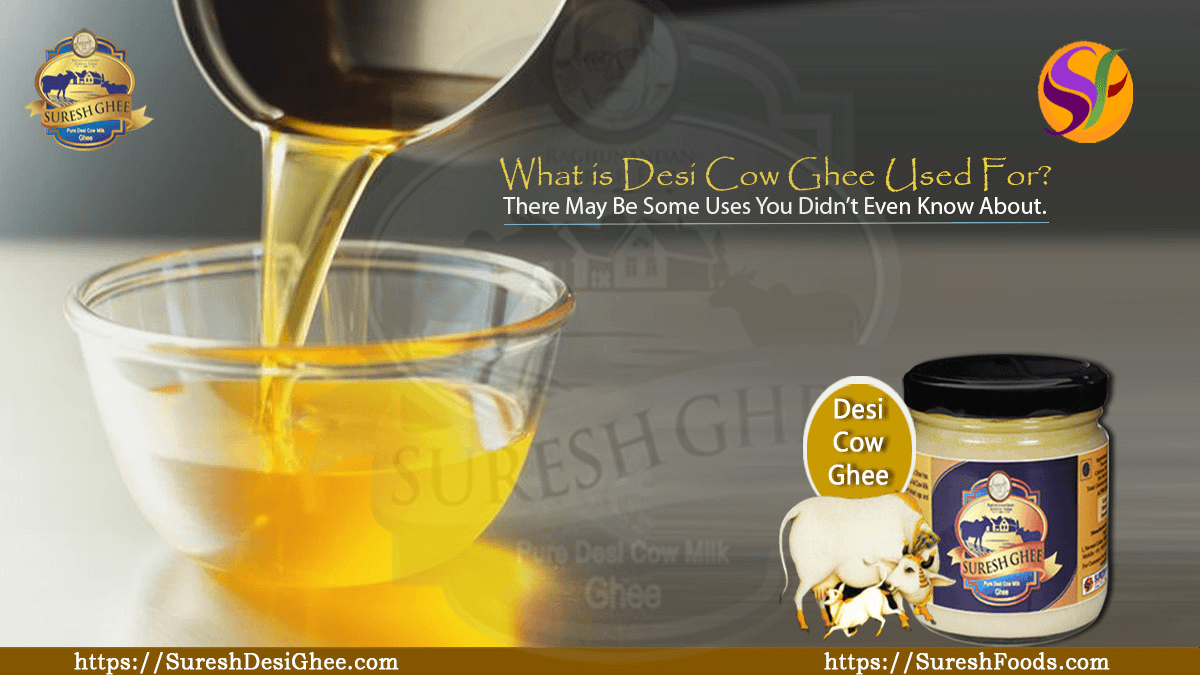
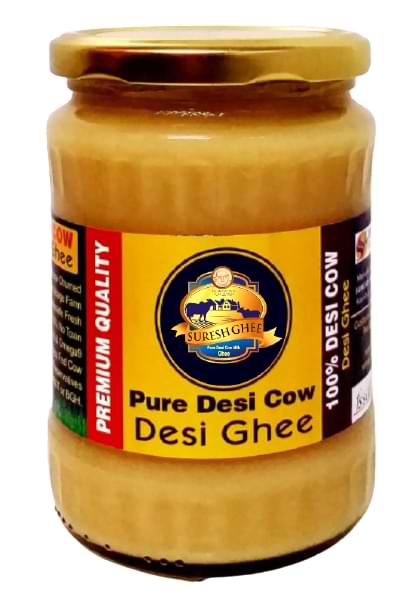
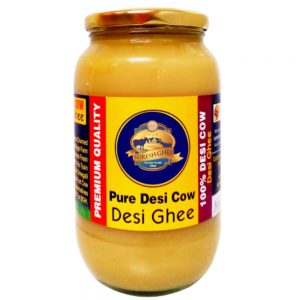
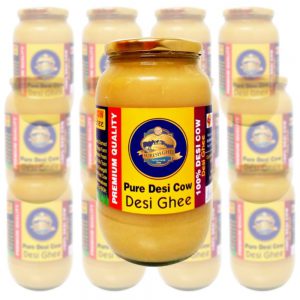
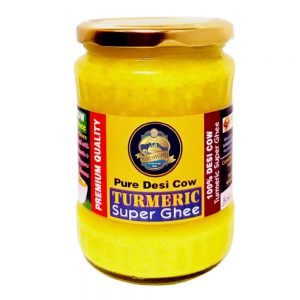
 WhatsApp us
WhatsApp us 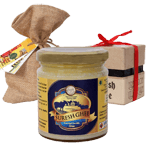
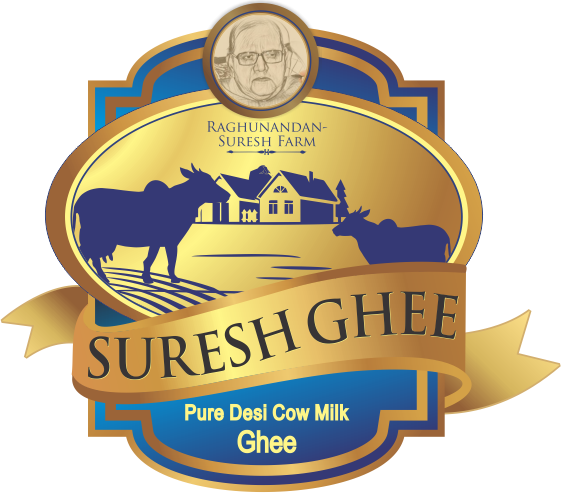
Naveen m...